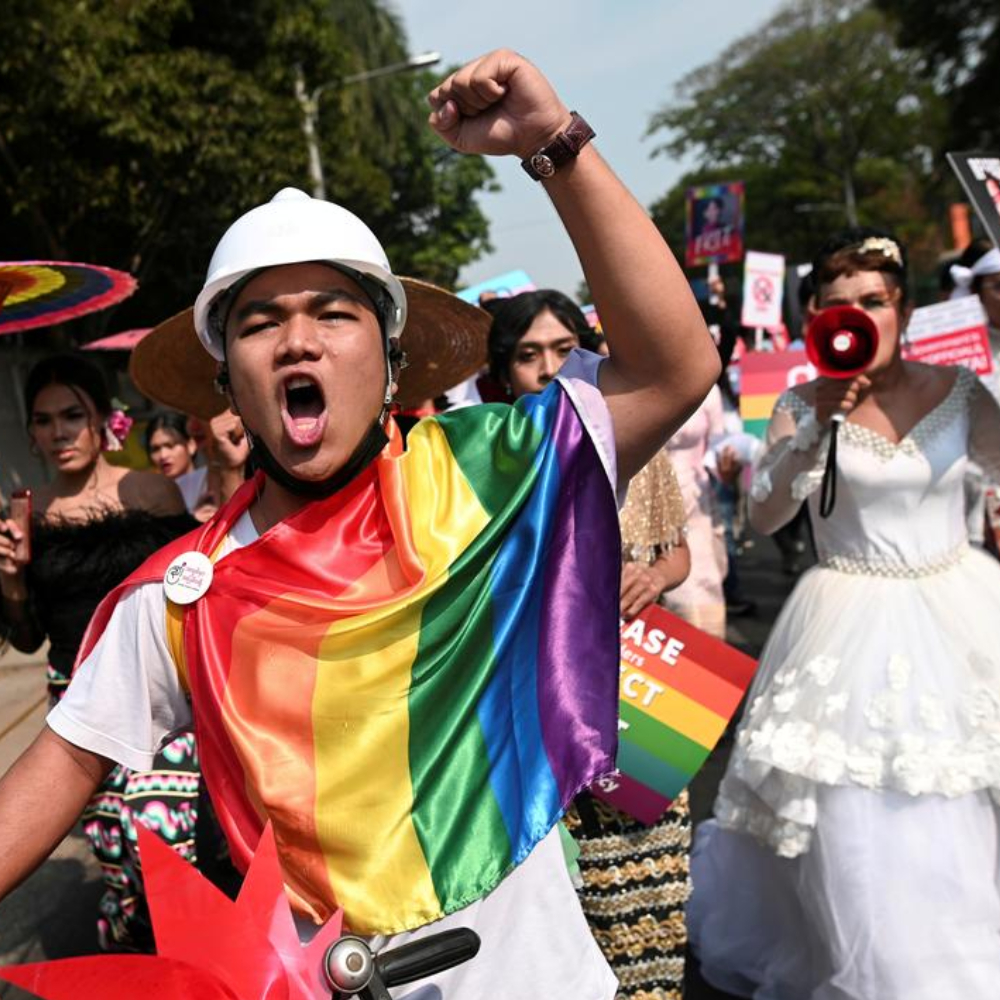Background on Myanmar
Myanmar itself is in Southeast Asia and neighbors Bangladesh, China, India, Laos, and Thailand. It is, per the BBC, a diverse nation of 54 million people, with multiple ethnic groups constituting the population (including the Rohingya Muslims, who have in recent years been subjected to torture, forced removals, and death at the hands of state authorities). It is a relatively fresh democracy in the world scene. For a long period of time it was a British colony, gaining its independence in the decolonization wave after the Second World War. This newfound independence was tarnished, for the most part, by almost five decades of military rule.
The military junta heavily cracked down on civil liberties, outside connections, and any sort of anti-junta advocates. It was a military state, and it was not a progressive military state by any means. LGBTI persons were not spared, and the old British anti-gay laws were, and still in large part are, on the books. Calling for up to ten years in prison, the British and the Myanmar military did not support LGBTI persons to any extent. This began to change in 2011, as the military junta was replaced by a pro-democracy government and elections were held. Under Aung San Suu Kyi, the country was slowly becoming more open to the concept of accepting LGBTI persons. The coup (orchestrated by the military to oust the democratically elected government), however, has thrown this into doubt. Fearing that their hard-fought progress may be lost, LGBTI activists have become a visible and vocal presence among the other pro-democracy protestors who are waging the struggle against the newly implemented military rule.
Stories on the Ground: Hope, Progress, and a Path Towards Acceptance?
The impact on the ground by LGBTI activists is truly extraordinary, and it has shown them to be brave and honorable citizens to many who previously disliked them. Kyaw Hsan Hlaing and Emily Fishbein of “Time Magazine” have taken many stories from LGBTI people who are on the front lines of the protests, and the same sentiment can be found over and over. Sue Sha Shin Thant, a transgender woman who had experienced discrimination and social exclusion in the country, has now been able to join forces with many of the very people who once excluded her. Her remarks could not show more of an about-face in the community, as she notes that “people see that LGBTQ+ people are brave and they applaud and encourage us… we receive love.” Another moving story comes from a transgender man named Maung E.B. Maung and mentions that, after leading a small group of LGBTI protestors in the city of Monywa, the protesting university students accepted them into their ranks. He says that “we are like one group; we are not different. I am proud of being LGBT and I am proud of myself for participating in the protests… when we hold our flag, some people have come to us and said that they are also LGBT, and asked to join us.” The two stories that the “Time Magazine” journalists followed are not unique among the protests, as the attitude is reflected in a piece by the Thomson Reuters Foundation as well.
In the Thomson Reuters Foundation article, more stories are followed that show how integral the LGBTI activists are. Ko E.T., a gay man in Shewbo, says that his reasons for protesting are quite practical in that “under military dictatorship, we will face discrimination… there is no way it will protect the rights of LGBT+ people.” Another activist named Jel Li, who works for a nonprofit that helps transgender men, says that “even though, as LGBT+ people, most of us will not have sons or daughters, we are fighting for the future generations including all LGBT+ people… we don’t want to move backward.” As the stories in both articles show, these LGBTI activists have joined protestors, locking arms with people who once thought they had no real place in society. The pro-democracy protests have united many people in the country, and hope is in the air that all people, from the LGBTI community and beyond, will be able to share in the rights and guarantees that democracy can offer. Progressive thought is there, attitudes are changing, and the path towards acceptance is there. It is a long road, and it certainly won’t be made easier by the brutal military forces of the country, but the spark of hope has lit a large flame which, given enough oxygen, can burn down the prejudices of old and bring about a new era of civil prosperity in Myanmar.

Alexander Champeau, 30th March 2021

